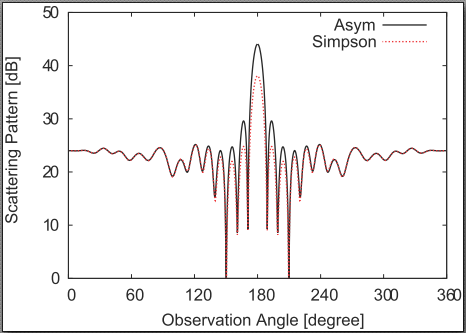I am looking forward to solving the integration in the following equation with the assumption that $ka$ is very large
\begin{align} H = 2jka\int_{-\pi/2}^{\pi/2}\cos{(\varphi-\phi)}e^{jka[\cos{\varphi}+\cos{(\varphi-\phi)}]}\ d\varphi \end{align}
I used the steepest descent path method to handle the integration, then from the saddle point $\varphi_s = \frac{\phi}{2}$, I found the saddle point contribution to the integral. However, the endpoints also contribute to the integral and they are estimated by asymptotic expansion by integration by part technique. The endpoints contribution is as following: \begin{align} H^{endpoint}=\frac{-4j\sin{\phi}}{1+\cos{\phi}}\sin{[ka\sin{\phi}]} \end{align} The asymptotic result is the summation of saddle point contribution and the endpoints contribution.
When I check the results and compared this asymptotic approximation by the numerical integration, I found something wrong with the asymptotic approximation when $\phi\rightarrow \pi$ (the saddle point goes to the endpoints). Somehow the results have been blowed up when $\phi\rightarrow \pi$. The comparation between two methods is shown as the below figure. Could someone help me how to find the exact asymptotic result when $\phi\rightarrow \pi$.

